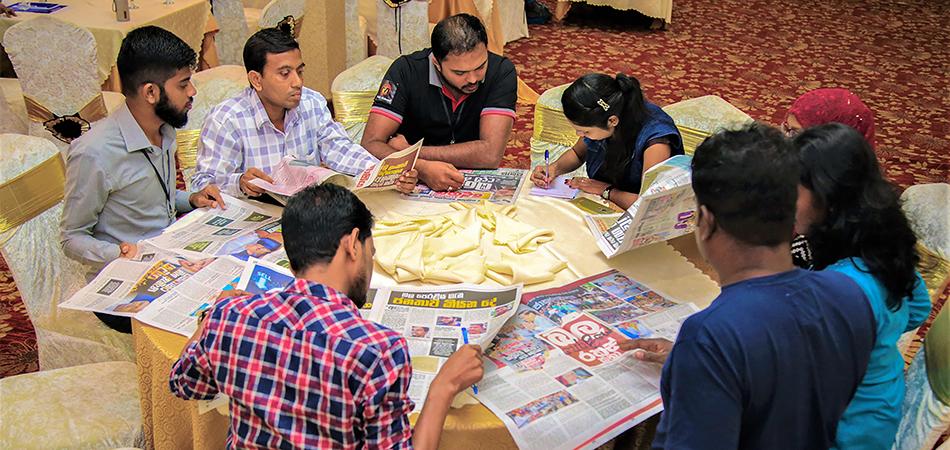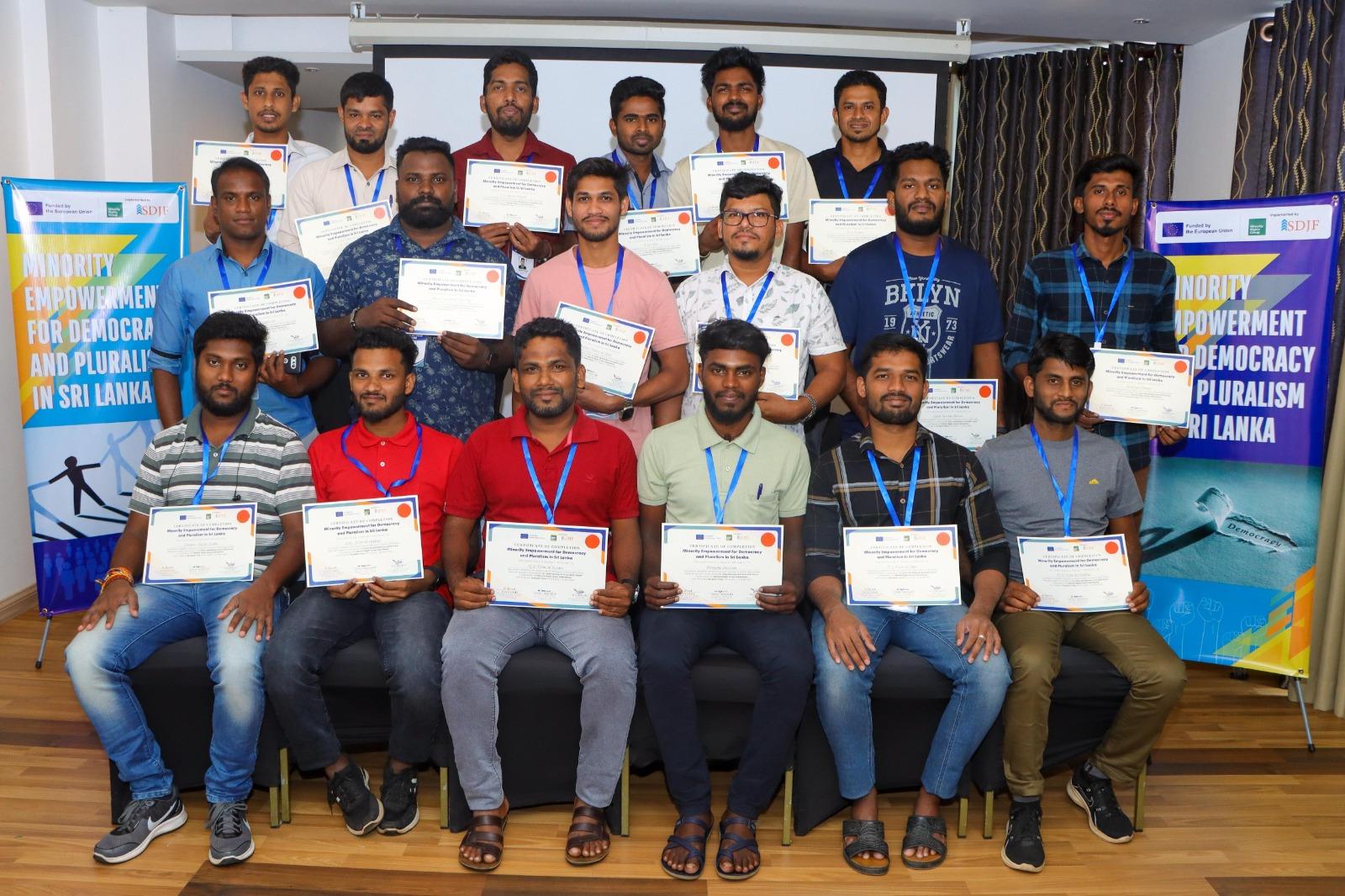Dismantling the Manacles of Ethnic Identity
29 July 2020 | SDJF_Admin

Salzburg Global Fellow Mohamed Azad explores how two young journalists from different cultures realized ethnic identities are only human-made barriers to a peaceful coexistence
A decade of peace is not sufficient to heal three-decade-old wounds. Despite the end of the civil war 10 years ago, the people of Sri Lanka with different cultural identities still find it difficult to look at each other with empathy and tolerance. Deep wounds of mistrust have emerged from time to time, leading to chaotic eruptions, threatening the delicate peace the country is striving to sustain.
In early March 2018, several cities in Kandy district, such as Digana and Theldeniya in the central highlands of Sri Lanka, were engulfed by ethnic tensions. Being the city of the last kingdom of ancient Sri Lanka and the home of the holiest Buddhist temple, this region is known for its Sinhala Buddhist predominance with a minority of people from other ethnicities. For centuries, people from different ethnicities peacefully coexisted until an unfortunate incident between a Sinhalese man and several Muslim youths that ended in the Sinhalese man's death.
Something that could have been yet another fight between two groups of people assumed ethnic dimensions. It eventually ignited a massive ethnic tension that lasted for almost a week. This [incident] was the first large scale violence since the chaos in Aluthgama in 2014. Sinhalese mobs organized themselves to destroy [the] properties of Muslims in retaliation. To control the situation, the government declared a state of emergency, deployed armed forces and the police along with an island-wide social media ban to prevent mobs from getting organized for more attacks and the spread of hate speech.
When Kandy was in flames, Madushanka (name has been changed), a young Sinhalese Buddhist journalist from Polonnaruwa, another city of historical significance similar to Kandy, which is predominantly Sinhalese Buddhist, was watching the developments from afar. At first instinct, he was in solidarity with the fellow Sinhalese people and thought his community was under threat from the Muslim minority. He joined the online and social media protest against Muslims and frequently shared anti-Muslim content through his social media accounts mainly through Facebook and WhatsApp.
Intervention
Madushanka noticed an advertisement in the newspaper about the MediaCorps Fellowship Program, implemented by the Sri Lanka Development Journalist Forum (SDJF) with the support of the International Research and Exchanges Board (IREX). He applied and got selected for the first-ever cohort in 2018.
The Fellowship Program builds the capacity of 34 young journalists and media students, improving their multimedia storytelling skills by enabling them to use their smartphones to foster cross-cultural understanding and reconciliation in Sri Lanka. As part of the program, each fellow pairs with another from a completely different ethnic, religious, and geographic background. The pairs host each other for a week to deepen their knowledge about other communities and produce stories on cross-cutting issues affecting each other's community.
For this Fellowship, coincidently, Madushanka was paired with Mohamed Samad (name has been changed), a Muslim journalist from Digana in Kandy district. He witnessed the violence breaking out against his community, dismantling the peaceful life the people of all ethnicities in Kandy had shared. When Madushanka visited Samad and stayed with him, exploring the latter's community, Madushanka's perceptions slowly began to change. Samad took Manoj to the areas affected by the recent ethnic tensions and allowed him to talk with the victims, the details of which startled Madushanka. The experience shattered his prejudices to the extent he felt guilty having been a part, in some way, of the violence.
Result
"I have always felt that Sinhalese, as the majority ethnic group, should receive priority. As a journalist who work[s] both online and in print media, I always tended to highlight this in my writings. But after taking part in the MediaCorps Fellowship, I realized that every human being should be treated equal[ly] and that humanity should always be prioritized over ethnicity, whether it is majority or minority," says Madushanka.
Together with Samad, Madushanka visited the Muslim mosques and Buddhist temples. Samad recalled how some humane Sinhala Buddhist people and monks had protected them as they prayed inside the mosques during the riots reminding Madushanka the love and understanding of a majority can overpower the hatred instigated by a minority. The days spent with Samad progressively cleansed Madushanka of his prejudices, and as he continued his quest, discovered the Sinhalese and Muslims in Kandy share certain names, and probably share the same genes and links at some point through the endless lines of generations.
Madushanka adds that though he has visited Kandy several times before, his visit to Kandy in the company of Samad allowed him to look at the same city from a totally different angle, to discover the untold stories of its marginalized communities that lay beneath the city labyrinths and its world-renowned historical significance. He acknowledges the visit made a tremendous impact and change in his life, especially helping him to realize his misconceptions and to understand ethnic identities are only human-made barriers to a peaceful living.
Madushanka is grateful today he has come a long way from the conventional young journalist whose perceptions and writings were shadowed by his ethnic bias to a more responsible and ethnically sensitive journalist. Moving further, he is now determined to fight on behalf of the fellow Muslims to restore the glory of key historic Muslim icons who fought alongside the Sinhalese leaders to regain independence to Sri Lanka in the fight against the British.
Latest News

SDJF and MIM Launch Sri Lanka’s First Certificate Course on Ethical Reporting and Minority Protectio
27 February 2025
[ Read More ]

Kicking off 2025 with positivity and teamwork!
3 January 2025
[ Read More ]

SDJF Partners with HELVETAS to Launch EMPOWER: Tackling Youth Radicalization and Building Resilience
10 December 2024
[ Read More ]

SDJF Concludes Successful Annual General Meeting 2024
30 November 2024
[ Read More ]

Empowering Sri Lanka’s Next Generation of Journalists: A Journey Toward Ethical and Inclusive Media
20 October 2024
[ Read More ]